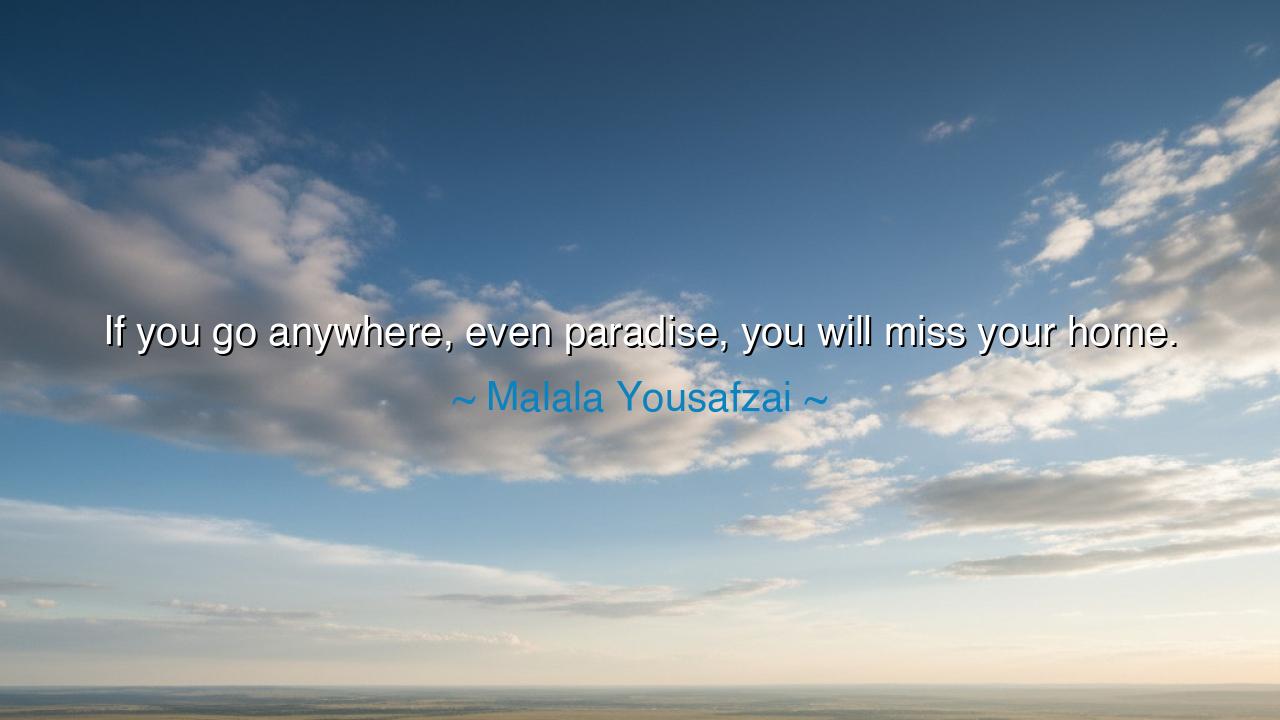
If you go anywhere, even paradise, you will miss your home.






“If you go anywhere, even paradise, you will miss your home.” Thus spoke Malala Yousafzai, a voice of courage rising from the fires of exile and struggle. In these few, tender words, she revealed a truth that echoes through the ages: that home is not merely a place of walls and roofs, but the soil from which the soul itself grows. To be torn from it, even for glory or peace, is to carry a quiet ache within the heart—a longing no splendor can soothe, no paradise can erase. For the spirit is like a tree: though it may bloom in foreign lands, its roots remain forever in the earth where it first took life.
Malala spoke not as a poet in comfort, but as one who had been driven from her homeland, from the valley of Swat, where her childhood songs once mingled with the sound of rivers and mountains. She knew what it was to leave behind not just familiar sights, but the essence of belonging—the air that carried her memories, the voices that shaped her, the laughter of her people. And so, her words carry the weight of all who have known exile, all who have stood beneath foreign skies and felt the silent pull of home upon their hearts. Even paradise, she said, even the place of ultimate joy, would not silence that yearning.
In this truth, she joins the company of the ancients, who too spoke of the sacred bond between the soul and its home. When Odysseus, hero of the Greeks, wandered across oceans for twenty years, he was offered kingdoms, riches, and even the love of a goddess. Yet his heart remained restless, bound by the memory of his wife Penelope and the hearth of Ithaca. Though he had seen marvels fit for the gods, he longed only to feel the soil of his own island beneath his feet once more. For what is paradise, if the heart is far from the place where it first learned to love?
To miss your home is not weakness—it is a form of sacred remembrance. It is proof that we are creatures of roots and relationships, that our joy is intertwined with the places and people who shaped us. The modern wanderer, who moves ceaselessly from city to city, may forget this truth for a while. But sooner or later, in some quiet hour, the soul stirs with longing for the familiar—the smell of the earth after rain, the taste of a meal shared with family, the comfort of voices that know your name without asking. That is home, and its absence awakens an ache deeper than words.
And yet, there is also a hidden power in this longing. For when we leave our homes and carry them in our hearts, we become their living ambassadors. Malala herself transformed her exile into a torch of hope. Though she could not return to her valley, she carried its memory into the halls of power, speaking of its struggles and dreams before the nations of the world. In her, we see that to miss your home is not merely to grieve—it is to love fiercely enough that one’s voice keeps its spirit alive across oceans.
Let this be a lesson to all who wander: never forget where you came from, for your home is the wellspring of your identity. Honor it in your speech, in your actions, in your gratitude. If you are far away, build a little piece of it wherever you dwell—through kindness, through remembrance, through the rituals that once gave your life shape. Keep its songs alive, its stories spoken, its lessons lived. For even in paradise, those who forget their home lose the deepest part of themselves.
And so, dear traveler, if ever you find yourself in a place of beauty and peace yet feel a shadow of longing within, do not mistake it for sorrow. It is the echo of your beginnings calling you home. Remember then the wisdom of Malala: even paradise is incomplete without home. Cherish the soil that raised you, the faces that first loved you, the air that once filled your laughter. For to know where your heart belongs is to walk the earth not as a wanderer, but as one who carries home within, wherever destiny may lead.






AAdministratorAdministrator
Welcome, honored guests. Please leave a comment, we will respond soon